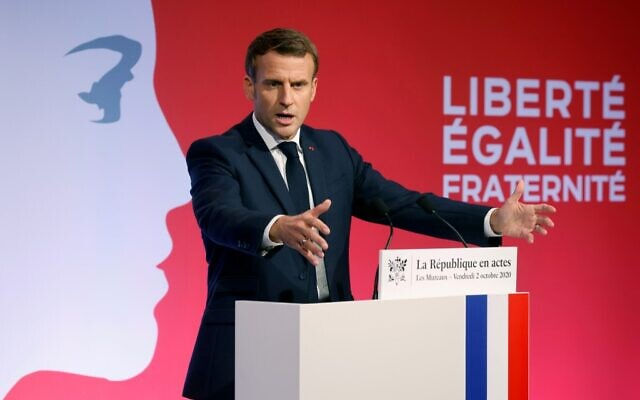Macron calls Islam a religion ‘in crisis,’ unveils plan to fight radicalism
- Osas Airen
- Oct 3, 2020
- 4 min read
Radicals have ‘swooped in,’ says French leader; vows ‘no concessions’ in push to eradicate extremism in schools and mosques; warns Islamist ‘separatism’ creating counter-society

French President Emmanuel Macron unveiled a plan Friday to defend France’s secular values against radical Islam, announcing stricter oversight of schooling and better control over foreign funding of mosques.
Describing Islam as a religion “in crisis” worldwide, Macron insisted that “no concessions” would be made in a new drive to eradicate extremist religious teaching in schools and mosques.
At the same time, Macron said France must do more to offer economic and social mobility to immigrant communities, adding radicals had often filled the vacuum.
His long-awaited address came 18 months before presidential elections where Macron is set to face a challenge from the right, as public concern grows over security in France.
“Islam is a religion that is in crisis all over the world today, we are not just seeing this in our country,” Macron said in Les Mureaux, a town outside Paris with a historically large immigrant population.
He said extremists were seeking to indoctrinate new converts across France, which has one of the largest Muslim populations in Europe.
He denounced a trend of “Islamist separatism” that flouts French rules and seeks to create a “counter-society” holding its own laws above all others.
This form of sectarianism often translates into children being kept out of school, and the use of sporting, cultural and other community activities as a “pretext to teach principles that do not conform to the laws of the republic,” Macron said.
He said the government would present a bill in December that would strengthen the country’s bedrock 1905 law that officially separated church and state
.
Macron gave his speech while a trial is underway in Paris over the deadly January 2015 attacks on satirical newspaper Charlie Hebdo and a kosher supermarket by French-born Islamic extremists.
Last week, a man from Pakistan stabbed two people near Charlie Hebdo’s former offices in anger over its publication of caricatures of the Prophet Muhammad. Macron noted both cases.
France has the largest Muslim population in Western Europe with up to 5 million members, and Islam is the country’s No. 2 religion.
The proposed bill would require all children from the age of 3 to attend French schools, and allow distance learning only for medical reasons. Associations, which receive state funding, would be made accountable for their spending, their sometimes invisible leaders and be forced to reimburse misused funds.
Macron called France’s schools “the heart of secularism (where) children become citizens.”
Authorities contend that the vector for inculcating Muslims with an extremist ideology was once the mosque but, today, the main vector is schools.
The proposed measures nevertheless address mosques, which Macron said are sometimes subject to hostile takeovers, as well as imams to keep houses of prayer and preachers out of the control of people who use religion for their own ends.
“In a few days, you can see radical Islamists…take control of associations (running mosques) and all their finances. That won’t happen again,” the French president said.
“We’re going to install an anti-putsch system, very robust, in the law,” Macron said without elaborating.
The bill, which is to be sent to religious leaders for review this month, also includes putting a gradual end to the long-standing practice of importing imams from elsewhere, notably Turkey, Algeria and Morocco, and instead training imams in France to assure there are enough. A Muslim organization that serves as an official conduit to French leaders is to take part in the project.
‘Liberate’ French Islam
Among the new law’s provisions, there will be closer scrutiny of the curriculum at private schools and stricter limits on home-schooling for reasons other than a child’s health problems.
Macron said there had been increased reports of abuses by sub-contracting staff, including bus drivers refusing women entry for wearing clothing considered too revealing.
He emphasized that it was necessary to “liberate Islam in France from foreign influences,” naming countries such as Saudi Arabia, Qatar and Turkey.
To this end, the government will step up checks on foreign financing of mosques and clamp down on letting imams go abroad for training, or on hosting foreign preachers on French soil.
‘Ghettoization’
Macron stressed that the measures did not seek to stigmatize or alienate France’s Muslims but to bolster “our ability to live together.”
He urged better understanding of Islam and said the problem of radicalization was partly a product of the “ghettoization” of French cities and towns where “we constructed our own separatism.”
“We have concentrated populations based on their origins, we have not sufficiently created diversity, or ensured economic and social mobility” in segregated areas, he said.
Radical Islamists have swooped in, taking advantage of “our withdrawal, our cowardice,” he added.
France has in recent years been forced to take a hard look at its core republican values, perceived by many to be threatened by Islam in the wake of several terror attacks since 2015 targeting secular liberties such as freedom of expression.
Macron was speaking one week after a man wounded two people with a meat cleaver outside the former Paris offices of the Charlie Hebdo satirical weekly, which the government denounced as “Islamist terrorism.”
Staff at Charlie Hebdo were massacred in January 2015 by Islamist gunmen seeking to avenge its publication of caricatures of the Prophet Mohammed.
In January, a renewed debate about freedom of expression erupted when a teenager received death threats for attacking Islam in an expletive-laden Instagram rant.
And earlier this month, divisions were highlighted when MPs walked out when a university student entered parliament in a headscarf.
Source: THE TIMES OF ISRAEL



































Comments